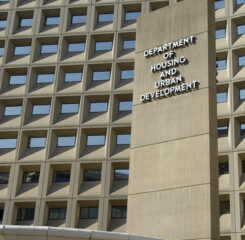HUD Will Require Owners to Notify At-Risk Residents of Emergency Rental Assistance
On October 7, HUD is expected to publish in the Federal Register an Interim Final Rule, which will be immediately effective, to allow the HUD Secretary to require HUD-assisted owners, like owners of Section 202 and Section 8 PBRA, and public housing agencies to notify tenants facing eviction for nonpayment of rent of the availability of Emergency Rental Assistance (ERA), and to provide adequate time for residents to secure Emergency Rental Assistance.
Following the Interim Final Rule, HUD is then expected to issue a formal notice to carry out such requirements shortly.
“For many months, our Department has worked with landlords and owners who do business with HUD to ensure they access the Emergency Rental Assistance Program and do everything they can to keep people housed. This rule is a significant step in raising tenant awareness about the availability of funds that can assist them with past due rent and allowing them additional time to access relief that may stave off eviction entirely. HUD will continue to review additional actions to help protect individuals through the duration of the pandemic,” HUD Secretary Marcia Fudge said in an October 6 statement.
In the Interim Final Rule, HUD notes that ERA funding still has not reached many eligible tenants at risk of eviction for nonpayment, creating an increased risk that evictions will occur simply because funding that is specifically meant to help pay much or all of the back rent in question is not provided in time.
HUD has determined that the rule will prevent more than 200,000 evictions from HUD-subsidized housing, evictions which HUD says would interfere with the operation of HUD’s programs and the accomplishment of HUD’s mission.
In the Interim Final Rule, HUD acknowledges the ability of residents to recertify their incomes but calls this remedy insufficient to protect many residents from eviction for nonpayment of rent because not every tenant who could benefit from recertification has done so, whether because owners have not offered recertifications or because tenants have chosen for a variety of reasons not to seek recertification. Additionally, HUD says owners might permit recertification for rent going forward, but not recertify the loss of income retroactively, meaning that coverage of rent arrears by ERA could still be necessary to help prevent future evictions.
HUD will publish a Notice outlining the specific information to be included in the lease termination notification to help eligible tenants obtain funding before a lease termination for nonpayment of rent occurs.
In addition to the notification requirements, the forthcoming HUD notice will extend the lease termination time period for tenants to at least 30 days following the notification. HUD this 30-day period is consistent with the longest of the standard periods to which owners are already accustomed for many evictions.
The forthcoming notice will not require owners to modify tenant leases, which provide notification procedures and time periods that may be more limited than those provided in this rule. However, the notice will require owners to follow this Interim Final Rule in place of the usual lease provisions at times when its provisions are in effect.

Most Recommended
November 08, 2024
 HOTMA: New Rules for Housing
HOTMA: New Rules for Housing
November 06, 2024
 Colleagues on the Move, November 6, 2024
Colleagues on the Move, November 6, 2024
November 06, 2024
 Analysis: What Does the Final CY2025 Home Health Rule Include?
Analysis: What Does the Final CY2025 Home Health Rule Include?
October 29, 2024
Katie Smith Sloan Urges Members to Build a Movement, Take Action
Recently Added
December 13, 2024
CAST Members in the News
December 13, 2024
a2 Pilot Awards Open for AI-based Healthy Aging Projects
December 13, 2024
HUD Finalizes 30-Day Eviction Notification Rule
December 12, 2024



